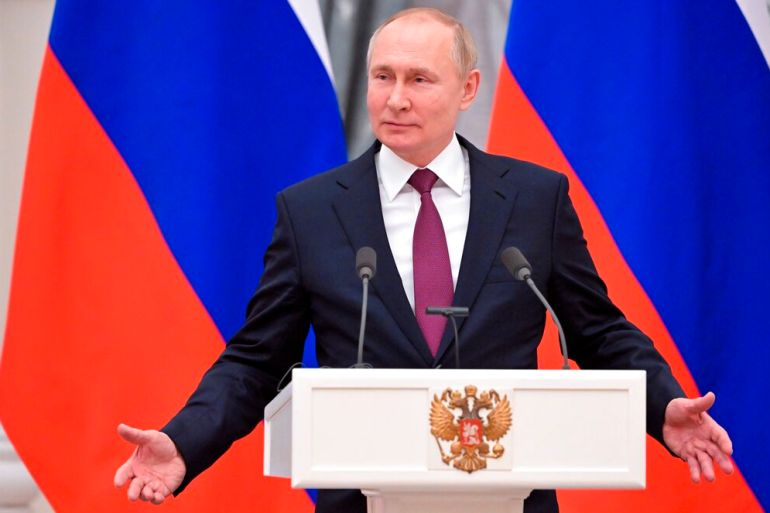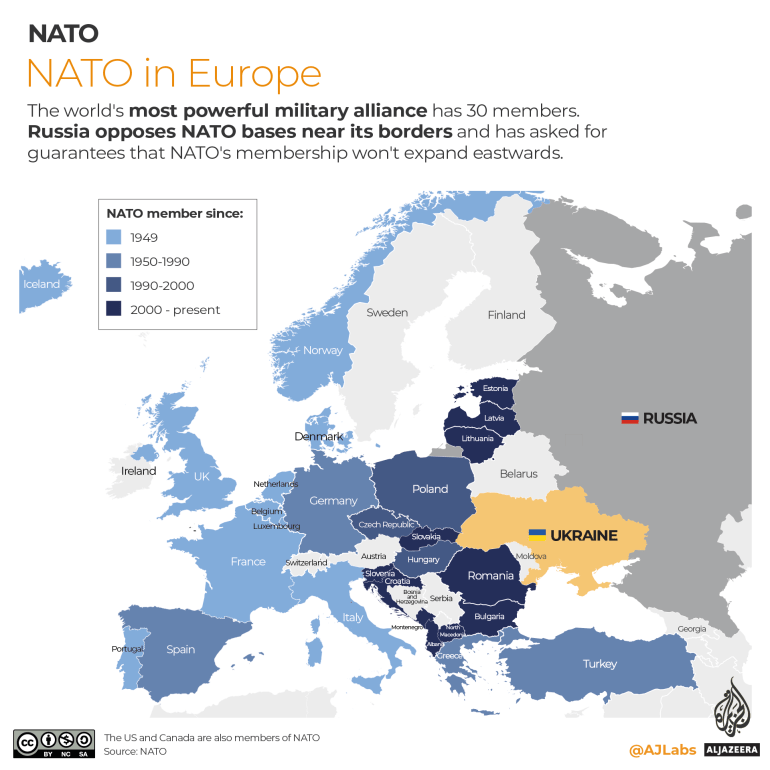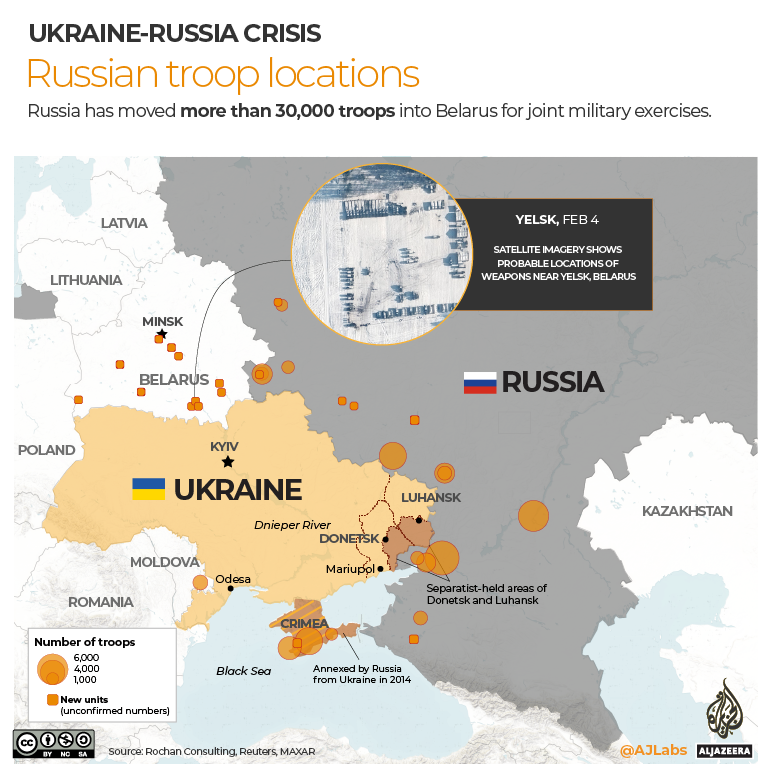Putin says he wants Ukraine NATO question resolved ‘now’
Russia’s president says Western assurances Kyiv will not join NATO military alliance in the near future are unsatisfactory.

Russian President Vladimir Putin has said Moscow does not want a war in Europe amid rising tensions over Ukraine but demanded that the issue of Kyiv’s relationship with NATO be resolved in its entirety immediately.
Speaking at a joint news conference on Tuesday after talks with German Chancellor Olaf Scholz, Putin said Russia had been informed by Western powers that its neighbour would not join the transatlantic military alliance in the near future. But he warned that was not a satisfactory assurance.
Keep reading
list of 4 itemsTimeline: How the Ukraine-Russia crisis reached the brink of war
Latest Ukraine updates: Renewed calls for de-escalation
Russia says ready to continue diplomacy amid Ukraine crisis
Russia has massed more than 100,000 troops around Ukraine’s borders and is campaigning for security guarantees from the West including a guarantee that Kyiv will be prevented from ever joining NATO’s ranks, despite Ukrainian President Volodymyr Zelenskyy pushing for it to do so.
“We need to resolve this question now … [and] we hope very much our concern will be heard by our partners and taken seriously,” Putin told reporters in Moscow.
“[And] As for war in Europe … about whether we want it or not? Of course not. That is why we put forward proposals for a negotiation process, the result of which should be an agreement on ensuring equal security for everyone, including our country,” he said.

Moscow announces partial pullback of forces
The United States and NATO have flatly rejected Russia’s main security demands – which include a call for NATO to cease all military activity in Eastern Europe – but have sent counterproposals to Moscow.
Despite emphasising the need for the West to heed the Kremlin’s primary concerns, Putin said Russia was ready to engage in talks on limiting the deployment of intermediate-range missiles in Europe, increasing the transparency of military drills and other confidence-building measures.
His remarks came after Russia’s defence ministry said it was orchestrating a partial pullback of its forces from locations near Ukraine after concluding military drills.
Moscow gave no details on where the soldiers were being pulled back from, or how many were being moved, but the defence ministry published footage showing tanks and other armoured vehicles being loaded onto railway flatcars.
Scholz welcomed the announcement of a pullback as a “good signal” and said diplomatic efforts to resolve the crisis were far from exhausted.
“For us Germans but also Europeans, sustainable security can only be reached … with Russia. Therefore it should be possible to find a solution. No matter how difficult and serious the situation seems to be, I refuse to say it is hopeless,” he said at the news conference alongside Putin.
Invasion still possible, Biden says
Other leaders were more cautious. Later on Tuesday, US President Joe Biden cast doubt on Moscow’s claims of a partial withdrawal, saying that Russian troops near Ukraine remain in a “threatening position”.
“The fact remains right now Russia has more than 150,000 troops is circling Ukraine and Belarus and along Ukraine’s border; an invasion remains distinctly possible,” Biden said.
British Prime Minister Boris Johnson also said “the intelligence that we’re seeing today is still not encouraging”, and Ukraine said the reported pullback needed to be seen to be believed.
“When we see troops pulling out, we’ll believe in de-escalation,” Ukrainian Foreign Minister Dmytro Kuleba said.
Al Jazeera’s Natacha Butler reporting from Kyiv said “there is a lot of skepticism” over Russia’s announcement.
“The Russian Federation, [Kuleba] said, is often saying that it does things, but then it does exactly the opposite,” Butler said.
NATO’s chief meanwhile welcomed signals from Russia in the past two days that it may be looking for a diplomatic resolution, but he urged Moscow to demonstrate its will to act with a “significant and enduring withdrawal of forces … and not least the heavy equipment”.
“There are signs from Moscow that diplomacy should continue. This gives grounds for cautious optimism. But so far we have not seen any sign of de-escalation on the ground from the Russian side,” Secretary-General Jens Stoltenberg told reporters in Brussels.
He added that Russia has in the past moved into areas with troops and equipment, then pulled back leaving military material in place, creating the potential for forces to regroup.

Russian parliament vote
Earlier on Tuesday, Russia’s lower house of parliament voted to ask Putin to recognise two Russian-backed breakaway regions in eastern Ukraine as independent, prompting a warning from the EU to Moscow not to follow through.
Recognition of the self-declared Donetsk and Luhansk People’s Republics could kill the Minsk peace process in eastern Ukraine, where a conflict in the Donbas region between government forces and Moscow-backed separatists has cost 15,000 lives since 2014.
“Kyiv is not observing the Minsk agreements. Our citizens and compatriots who live in Donbas need our help and support,” Vyacheslav Volodin, the State Duma speaker, wrote on social media.
Ukraine’s foreign minister and the EU’s top diplomat said a decision to recognise the regions would be a violation of the Minsk agreements.
Putin declined to be drawn out on how he plans to respond to the appeal. He said Russians were sympathetic to the residents of the Donbas region, but he wanted the regions’ problems to be resolved through the Minsk accords.